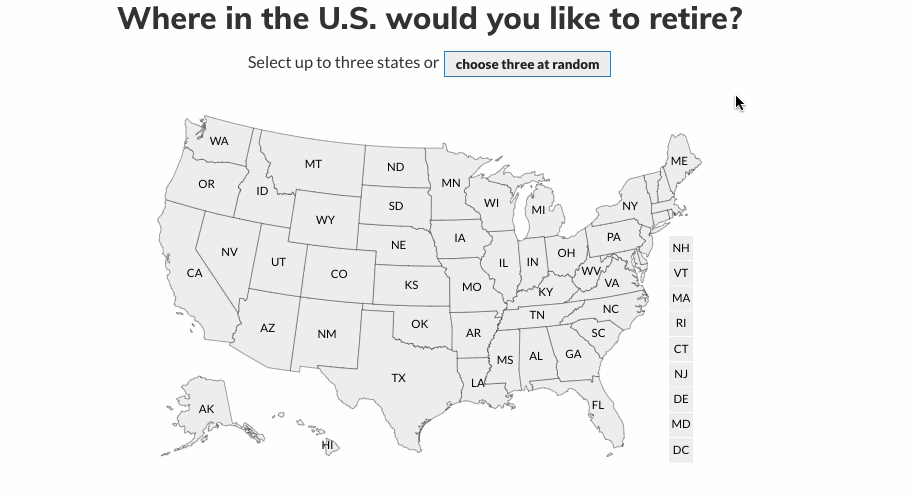
Getty Images
Dear MarketWatch,
My wife and I will retire in 2024 and are starting to think about where we’d like to end up. Here are some of our parameters:
– Sell our current house and buy a house in a price range of $400,000 to $700,000.
– Love outdoor recreation like hiking, biking, kayaking.
– In or near a small town. College town is a bonus. In or near mountains is a bonus.
– Location: Mid-Atlantic is the first choice. Mountain West is good also.
– Weather: Four seasons. Not a terribly long winter. Not in the mega-drought zone.
Any and all suggestions are welcomed!
Thanks,
Dave
Dear Dave,
The good news is you and your wife have lots of choices, even with one or both of those bonus criteria. So many great places to hike, bike and kayak! I hope you’ll take the opportunity to spend some time in those places that make your short list, seeing them at their best and worst, whether that’s weather or crowds, and testing out daily life. College towns are very different depending on whether students are around—and some neighborhoods may be dominated by students.
You may also want to double-check your retirement finances; here’s a free retirement calculator to get you started.
Obviously a lot can change in three years, whether it’s the local housing market or your criteria. You may want to spend some extra time with the MarketWatch “where should I retire” tool to see if there’s something else you’d like to consider.
Where’s the best place for me to retire

In the meantime, here are three suggestions to get you started:
Poughkeepsie, New York

Getty Images
The MarketWatch “where should I retire” tool suggests Ithaca, but that might be too much snow for you. Instead, what about the Hudson Valley?
Center your search on Poughkeepsie, the seat of Dutchess County and home to both Vassar College and Marist College. (Neighboring Hyde Park, home of Franklin Roosevelt, offers the Culinary Institute.) Your housing money will go far here, or you may prefer something more upscale and more rural (though without the college town). You could look at Rhinebeck and Hudson, among others.
The Catskill Mountains (98 peaks, the highest of which is 4,180 feet, plus many hiking options and even some ski slopes) are on the western side of the Hudson River. The Appalachian Trail crosses to the east of Poughkeepsie along Pawling Mountain and Depot Hill, and the new Empire State Trail means you can pedal virtually traffic-free from several miles west of Poughkeepsie all the way to New York City. (Or take an easier option: either a Metro North commuter train or Amtrak.)
As for kayaking, start with the Hudson River. The Wallkill River is another option. Some Catskill reservoirs are open to paddlers.
Snow levels will depend on elevation, of course. In general, expect average winter highs above freezing and average summer highs in the lower 80s.
The Hudson Valley covers more than one county, but to get you started, here’s what’s the housing market now in both Poughkeepsie and all of Dutchess County. These are listings on Realtor.com, which like MarketWatch, is owned by News Corp.
Blacksburg, Virginia

Getty Images
The MarketWatch “where should I retire” tool suggested this town of 44,000 in the southwestern corner of the state that is home to Virginia Tech and about 30,000 students. You’d be in the Blue Ridge Mountains and have even more of the Appalachian Trail close by.
To get you started, the town’s Parks and Recreation Department offers kayaking excursions and mountain-biking clinics. If mountain biking isn’t your thing, the paved 14-mile Huckleberry Trail (with some rolling hills) may be more your speed. Less than 30 miles from Blacksburg is the 57-mile crushed-stone New River Trail. Or take your kayaks to either the New River not far from town or drive 35 minutes to Claytor Lake State Park.
As I’ve written many times, I like college towns for the extra amenities they provide and that many public universities let seniors take classes for free. That is the case at Virginia Tech for those 60 and older.
Temperatures here will be more moderate than in Poughkeepsie with about a foot less snow. Average winter highs are in the mid-40s, and summer highs average in the lower 80s.
Here’s what the local housing market looks like, again using listings on Realtor.com
If you like the area but Blacksburg isn’t quite right, Radford, a town of nearly 18,000 plus 10,000 Radford University students, is about 15 miles away. You can also audit college classes there for free.
I’ve also previously suggested a number of other Virginia possibilities: Roanoke (though its population is nearly 100,000), Harrisonburg, Charlottesville, Lexington. They may also be options for you.
Pagosa Springs, Colorado

Getty Images
I don’t want to leave you without an option out West. With Pagosa Springs, you’d get an outdoor playground in Colorado, but the trade-off is no college town.
Pagosa Springs and, more broadly, Archuleta County (population 14,000) in southwestern Colorado is surrounded by roughly 2.5 million acres of national forest and wilderness, so plenty of hiking (and, often, mountain-biking) options. Chimney Rock National Monument is 20 miles west of town. You can kayak through town on the San Juan River, and then stop at a hot spring.
Elevation downtown is 7,100 feet, but it’s a dry, more desert-like climate with roughly 300 days of sunshine a year. Even so, nearby Wolf Creek Ski Area gets the most snow in Colorado with 400 inches a year.
While you’ll get snow in Pagosa Springs too, average winter highs are around 40 degrees. Average summer highs are in the lower 80s
There are a couple of drawbacks. One is spotty broadband internet access across the county, though that could change by the time you are ready to retire. Another is the small hospital; it has just seven overnight beds, so you may need to turn to Durango (75 minutes away) or even further afield. Colorado Springs (suggested here) and Denver can be a five-hour drive.
If you decide Pagosa Springs is too rural, look at pricier Durango, where 19,000 people live.
This housing market has been red-hot as more people work remotely, but it may be calmer by the time you retire. Here’s what’s on the market now in Archuleta County, according to Realtor.com.
The post We Want To Live in a Small Town Where We Can Bike, Hike and Kayak—So Where Should We Retire? appeared first on Real Estate News & Insights | realtor.com®.
source https://www.realtor.com/news/trends/we-want-to-live-in-a-small-town-where-we-can-bike-hike-and-kayak/
No comments:
Post a Comment